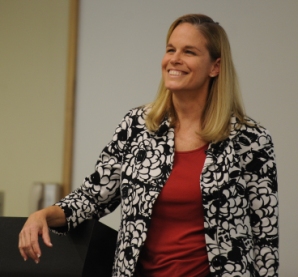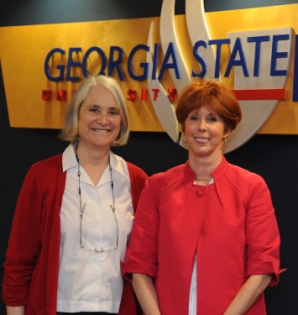College Site | Development | TOC - Department Dev Sites | CLHS TOC | Center for Law, Health & Society | News and Events | Center News | Speaker Programs Explore Chronic Disability Through Film Speaker Programs Explore Chronic Disability Through Film
March 30, 2011
ATLANTA - The Student Health Law Association co-sponsored two speaker programs with the Center for Law, Health & Society as part of its annual Bioethics at the Movies noontime film festival during the spring semester. These events are free and open to the public.
The viewing of short clips from the French film, The Diving Bell and the Butterfly, was held on February 16. This 2007 film depicts the story of Jean-Dominque Bauby, who had been the editor of the French fashion magazine Elle. After a massive stroke, Bauby suffered from "locked-in syndrome," which left him completely paralyzed except for movement in one eye, yet he retrained normal cognitive functioning. By blinking his one good eye to spell out letters of the alphabet, he dictated a book about his experiences on which the film was based. 
Melody Moore Jackson, PhD, an Associate Professor in the College of Computing at the Georgia Institute of Technology, led the discussion of locked-in syndrome. She created and directs the Brain Lab at Georgia Tech, whose mission is to research innovative human-computer interaction for people with severe disabilities.
"Dr. Jackson has developed some amazing new technology for patients with locked-in syndrome which allows them to communicate with others despite their physical limitations," said Charity Scott, Director of the Center for Law, Health & Society, who moderated both programs. "One audience member afterwards commented on the roller-coaster ride of emotions she experienced during this compelling program, going from feeling despair over the catastrophic consequences of this condition as depicted in the film to feeling optimistic about how much can be done to promote these patients' quality of life after listening to Dr. Jackson."
The showing of excerpts from the HBO documentary, Wartorn 1861 - 2010, was held on February 22. This 2010 documentary examines the lingering and often devastating psychological effects of combat on war veterans. Throughout history, these well-known but usually under-treated effects have been called by different names, including shell shock in World War I and combat fatigue in World War II. Today they are often characterized as post-traumatic stress disorder. 
Diane M. Janulis, JD, MSN, an attorney with King & Spalding in Atlanta, led the discussion of PTSD among war veterans and how the legal community can help U.S. vets suffering from this condition get access to treatment and services. Before going to law school, Ms. Janulis was a nursing educator and administrator with a master's degree in nursing concentrating on psychiatric nursing. She offers pro bono legal services to U.S. veterans in Georgia suffering from PTSD.
"A law student in the audience, whose brother currently serves in the military and who she fears is not getting adequate mental health treatment, cried tears of relief after hearing Ms. Janulis speak about the resources that are available to help veterans and military personnel," said Scott. "Other valuable connections were made among audience members and the speaker, including someone working on a veterans project with the Atlanta History Center and a law student organization that is assisting veterans."
Both programs attracted large and engaged audiences. "We are so fortunate to be able to draw on the incredible wealth of talent and expertise in our Atlanta community related to health and bioethics," Scott said. "Our speakers were highly knowledgeable and insightful about these two major challenges facing contemporary health care practice."
The videos of Melody Moore Jackson's and Diane Janulis's presentations are available here.